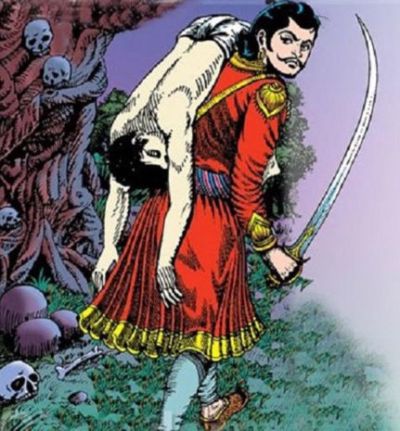“At first he cried because he was sad that he had to abandon his body, one that had grown with him in his many years on earth, one that his parents had fondled when he was a child, and one that he had used during tapasyā to obtain many siddhis…”
“For the love of one’s body is deep-rooted.”
“He then danced for joy because he was about to enter a new body, one that he could use again to acquire even more siddhis…and tell me, o yogeshwara, to whom is youth not pleasing?”
As the king uttered these words, the Vetāla flew off his shoulder, laughing. And King Vikram once more started to walk towards the banyan tree, determined to fetch him.
Because, the resolution of men who are determined surpasses the mighty mountains in firmness, and remains unshaken in all circumstances.

चतदुशो वतेालः
The twenty-fourth story
The Father who married the Daughter and the Son who married the Mother
ततस् तां तिमिरश्यामां चिताग्निज्वलितेक्षणाम् ।
स्मशाने भीषणे तस्मिन् वीरो रजनिराक्षसीम् ॥ १२,३१.१ ॥
घोराम् अगणयन् राजा गत्वा तां शिंशपां पुनः ।
स त्रिविक्रमसेनस् तं तस्या वेतालम् आददे ॥ १२,३१.२ ॥
स्कन्धे कृत्वा च तं यावत् प्रक्रामति स पूर्ववत् ।
तावद् भूयः स वेतालो नरदेवम् उवाच तम् ॥ १२,३१.३ ॥
भो राजन्न् अहम् उद्विग्नो न पुनस् त्वं गतागतैः ।
तद् एकं मे महाप्रश्नम् इमं कथयतः शृणु ॥ १२,३१.४ ॥
The night was dark, and the cremation ground resembled a Rākṣasī, black with darkness, with the burning pyres lighting up like her fiery eyes…
King Vikram walked back to the tree, and bringing down the Vetāla, placed him across his shoulders and started to walk back.
As the king walked in silence, the Vetāla spoke from his shoulder.
“Oh king! I am tired of going to and fro in this manner, but apparently you are not. So I will put to you a very difficult question. So listen to me carefully…”
आसीन् माण्डलिकः कोऽपि नृपतिर् दक्षिणापथे ।
धर्माभिधानो धौरेयः साधूनां बहुगोत्रजः ॥ १२,३१.५ ॥
तस्य चन्द्रवतीनाम भार्या मालवदेशजा ।
अभून् महाकुलोत्पन्ना वरस्त्रीमौलिमालिका ॥ १२,३१.६ ॥
तस्यां च तस्य भार्यायां भूपतेर् उदपद्यत ।
एकैव लावण्यवती नामान्वर्थाभिधा सुता ॥ १२,३१.७ ॥
प्रदेयायां च तस्यां स सुतायां धर्मभूपतिः ।
उन्मूलितो ऽभून् मिलितैर् दायादै राष्ट्रभेदिभिः ॥ १२,३१.८ ॥
ततः पलाय्य निरगात् स देशाद् भार्यया सह ।
दुहित्रा च तया रात्रव् आत्तसद्रत्नसंचयः ॥ १२,३१.९ ॥
मालवं प्रति च स्वैरं प्रस्थितः श्वशुरास्पदम् ।
विन्ध्याटवीं तया रात्र्या प्राप भार्यासुतायुतः ॥ १२,३१.१० ॥
तस्यां प्रविष्टस्योदश्रुर् इवावश्यायशीकरैः ।
निशानुयात्रां दत्त्वेव ययौ तस्य महीक्षितः ॥ १२,३१.११ ॥
आरुरोहाथ पूर्वाद्रिम् उत्क्षिप्ताग्रकरो रविः ।
मा गाश् चौराटवीम् एताम् इति तं वारयन्न् इव ॥ १२,३१.१२ ॥
ततो ऽत्र ससुताजानिः क्षताङ्घ्रिः कुशकण्टकैः ।
पदातिः स नृपो गच्छन् भिल्लानां प्राप पल्लिकाम् ॥ १२,३१.१३ ॥
परेषां प्राणसर्वस्वहारिभिः पुंभिर् आवृताम् ।
वर्जितां धार्मिकैर् दुर्गां कृतान्तनगरीम् इव ॥ १२,३१.१४ ॥
तत्र दृष्ट्वैव तं दूरात् सवस्त्राभरणं नृपम् ।
मोषितुं बहवो ऽधावञ् शबरा विविधायुधाः ॥ १२,३१.१५ ॥
तान् विलोक्य सुताभार्ये राजा धर्मो जगाद सः ।
पुरा स्पृशन्ति वां म्लेच्छास् तद् इतो विशतं वनम् ॥ १२,३१.१६ ॥
A long time ago, in the Deccan regions, there lived a Mandaleshvarā (ruler of twelve kings) named Dharma. He was a virtuous king, but he had many relatives who aspired to overthrow him and takeover his kingdom.
He had a wife named Candravatī, who hailed from the region of Mālava. She was of high lineage, and a very virtuous woman. From her was born a beautiful daughter named Lāvaṇyavatī.
When Lāvaṇyavatī grew to be of marriageable age, King Dharma was overthrown by his own relatives, who got together and plotted against him.
The king fled the city at night, taking with him his wife and daughter, and many valuable jewels. He took the route to Mālava, where is father-in-law lived.
By nightfall, they had reached the Vindhya forest. The night, that had accompanied him this far, took leave of him with tears of dew drops, and Sri Vibhaavasu (the sun) started to ascend on the eastern mountain, stretching forth it’s first rays and spreading them wide as if to say…
“Oh mighty king! Do not enter this forest, since it is infested with thieves!”
The king, his wife and his daughter continued walking, their feet wounded by the kuśa grass, and they finally reached the village of the Bhillas.
This village was the abode of thieves, people who robbed even their own neighbors of life and property…there was not one virtuous person there.
They spotted the king from a distance, clad in his fine clothes and ornaments, and many Śavaras (thieves), armed with weapons, rushed towards him.
King Dharma saw them coming and told his daughter and wife, “These thieves will try to get hold of you first, so rush back into the forest. I will fight them!”
to be continued…
